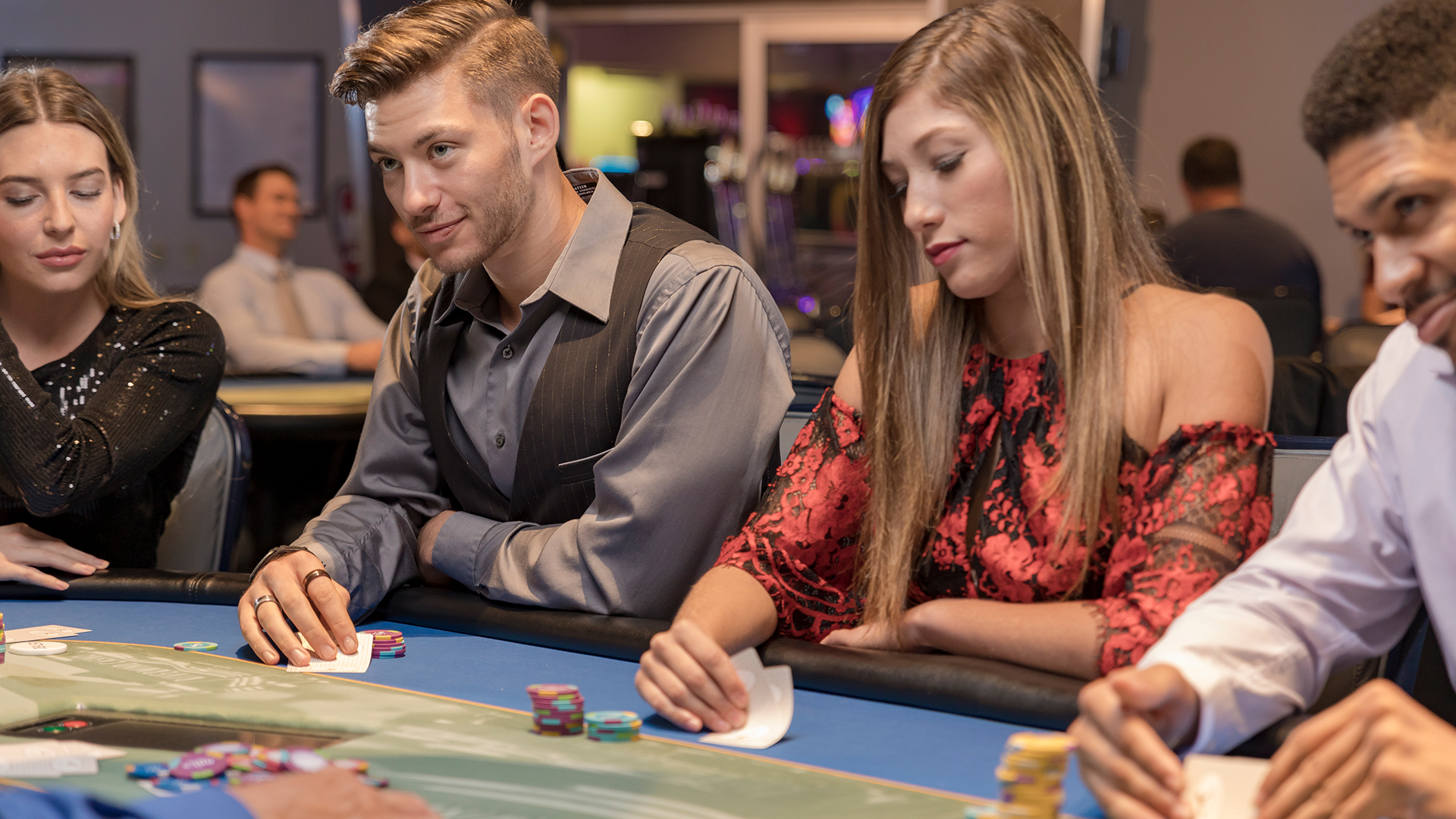We get the feeling. You’ve heard all about how much fun poker can be. You may have even played in a few friendly games for bottlecaps or trading cards as a kid. But every time you plan to give it another try, you stop outside the Poker Room doors or get cold feet and walk on by altogether.
But we’re here to tell you that it IS as much fun as you remember, and there’s nothing to be wary of. We recently sat down with one of our poker dealers, to talk about a few of poker’s “unwritten rules” and dispel some of the rumors that surround the formidable Poker Room.
Riverwind: Thanks for taking the time to talk about a few of the nuances and unwritten rules of poker! First of all, tell us a bit about your background and who you typically see in the Poker Room on a normal day:
Poker Dealer: I’ve been a poker dealer for just over 14 years. Typically, we see about 75% of the Poker Room filled with regulars and 25% are infrequent players.
Riverwind: What are a few things that might indicate someone is an experienced poker player?
Poker Dealer: Highly-skilled players call a hand less frequently than most players. They usually fold or raise, and players of a high skill level definitely fold more often that the average player. Also, highly-skilled players almost never talk about the play of the game and seldom criticize the play of others. Individuals that are apt to criticize another’s play are often just a moderately experienced or skilled player.
Riverwind: As a dealer of more than 14 years, do you have any pet peeves?
Poker Dealer: Get off the phone! It is frustrating to have to continually tell a player that the action is on them because they aren’t paying attention. This slows down the action and is inconsiderate of other players, whose time you are wasting. Similarly, individuals that wear headphones can be both inconsiderate and costly. Those players often need to be prompted to act and can miss action that happens before them, potentially committing them to bets they don’t realize they’re making. The excuse, “I didn’t hear their bet” won’t matter.
Riverwind: What are some ways a new player can show respect to the other players and dealers at the table?
Poker Dealer: First and foremost, be polite. Etiquette tips include:
Don’t slow roll (if you have the winning hand when it’s time to showdown, slow rolling is turning your cards over slowly, making the other player think he or she has the winning hand).
Again, operate phones and headphones with consideration.
Wait until it’s your action to act. Folding out of turn gives an advantage to players acting before you and can potentially change how they act.
Don’t say anything relevant about the hand while it’s going on, For example, say you fold an ace/seven after a player makes an aggressive pre-flop bet, but an ace comes out on the flop, you might feel the urge to say, “shoot, I folded an ace.” Giving away information in this manner puts other players still involved at a disadvantage.
As a dealer, we are trained to have thick skin and absorb the ire of players who are on the losing end of a hand, but personal attacks and vulgarity are out-of-bounds. It is common for a player who loses a hand to blame it on the dealer, which is fine – again, we let things roll off our backs, but common sense should indicate where the line is.
Riverwind: One common tactic of an inexperienced player, although sometimes unintentional, is the hit-and-run. Can you explain what that is and how it affects the other players in the game?
Poker Dealer: A hit-and-run refers to a player winning a big pot and then immediately taking their chips and leaving. This is considered improper (though not disallowed) because the social contract of poker implies that players aren’t only participating as a means of making money. Rather, the game itself (and gathering of people) has value, and a player who sits down, wins one hand and leaves is simply pulling money off the game, weakening its potential longevity. It’s simply bad form. The proper way to exit a game is to make it known some amount of time before you leave. The expectation is that there is an ebb and flow of wins and losses to the game.
Riverwind: How do rules (written and unwritten) vary in tournament play?
Poker Dealer: Tournaments are slightly different than cash games. Profanity, while frowned upon in cash games, is outright not allowed in tournament play. Similarly, exposing your cards before the dealer asks to see them carries a stricter penalty, as both of these infractions results in the player having to sit out for a round of the button and forfeiture of a small or big bling. In a cash game, if a player bets out of turn, the bet is binding unless a player who was skipped over decides to raise. In a tournament; however, a player who bets out of turn cannot take their chips back and fold if a skipped player decides to raise. The player who bet out of turn can decide if he or she would like to call the raise or raise to a higher amount, but if he or she folds, the out-of-turn bet remains in the pot. In the end, the etiquette is the same, but tournaments carry penalties that cash games do not.
Riverwind: On the topic of etiquette, can you talk about bluffing?
Poker Dealer: Bluffing during a hand is completely allowed, but there’s a difference in bluffing and angle-shooting, which is not allowed. An example of bluffing would be betting or raising with a weak hand, attempting to represent a strong hand in hopes that the opponent will fold. To contrast, an example of angle-shooting would be saying you have a flush when you don’t after all the action is done and it’s time to showdown, in hopes that your opponent will muck their hand. There are myriad examples of angle-shooting, but they all share the attribute of taking some action outside the bounds of the game rules to unfairly tip the scales in one’s favor. Bluffing is strategically pressing your luck, whereas angle-shooting is more akin to cheating.
Riverwind: Poker dealers are some of the hardest working people on the floor. Can you discuss the practice of tipping your dealer?
Poker Dealer: Tipping a dealer is always a voluntary courtesy, never mandatory, and dealers who act toward players otherwise are in the wrong. That said, it is customary to tip the dealer $1 when you win a pot. If you only win the blinds or a pot with only a few dollars in it, declining to tip the dealer is not considered a breach of etiquette. Alternatively, if the pot is large, then tipping a bit more is greatly appreciated, though, again, even a player who only tips $1 on a large pot should be thanked with equal enthusiasm as if they had only won a small one. Worthy of inclusion in the personal ‘pet peeve’ category, a dealer who does not thank a player for a tip, however small it may seem, is in the wrong and sets a poor precedent.
Thanks so much to our dealer for sitting down with us to talk about a few of the unwritten rules of the Poker Room! Do you think you’re ready to take a shot at the tables? With 153 seats and plenty of action happening every day, we’ve got a seat with your name on it. Check out our daily poker tournaments or come in 9 a.m. to 3:30 a.m. Sunday through Thursday and 9 a.m. to 4:30 a.m. Friday and Saturday to get your game on!

























Social Media
Connect with us to stay up to date on Riverwind Casino and you will always be in the know.